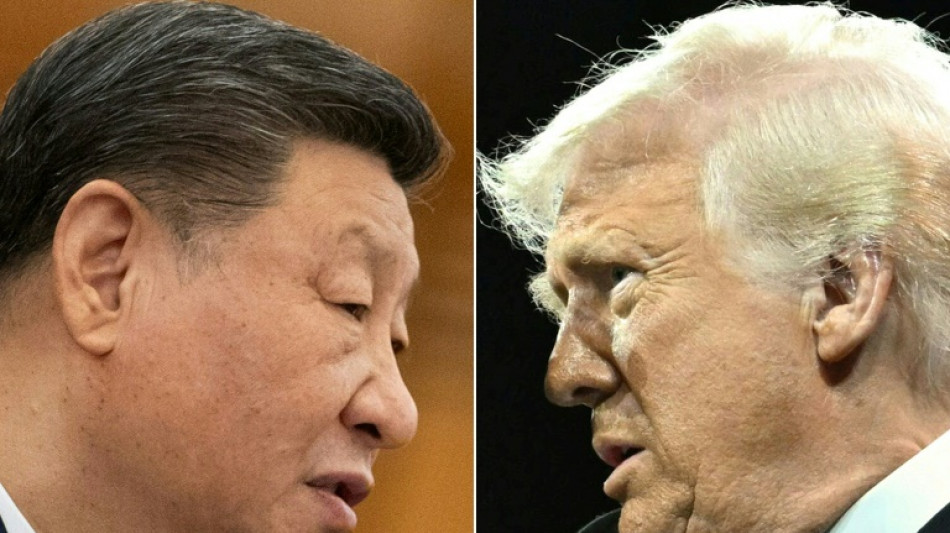
CMSD
0.0400


US President Donald Trump touted tariff negotiations with Japan on Wednesday while China angrily accused Washington of "blackmail" in a trade war that the WTO warns will have "severe" economic consequences for the global economy.
Trump remained upbeat about his strategy of imposing global tariffs, then negotiating individual trade agreements, with the goal of lowering barriers to US products and forcing more manufacturing to be based in the United States.
He said he would meet a Japanese delegation Wednesday both on tariffs and another of his longtime complaints -- the cost of the US military deployments to defend the crucial Pacific ally.
"Japan is coming in today to negotiate Tariffs, the cost of military support, and 'TRADE FAIRNESS.' I will attend the meeting," Trump posted on his Truth Social app.
The multiple negotiations the Trump administration says are underway are running parallel to a full trade war against top US economic rival China.
While the rest of the world has been slapped with a blanket 10 percent tariff, China faces levies of up to 145 percent on many products. Beijing has responded with duties of 125 percent on US goods.
There is little sign of rapprochement, with the White House insisting that China make the first move.
"If the US really wants to resolve the issue through dialogue and negotiation, it should stop exerting extreme pressure, stop threatening and blackmailing, and talk to China on the basis of equality, respect and mutual benefit," Foreign Ministry spokesman Lin Jian said.
"There is no winner in a tariff war or a trade war," Lin said, adding: "China does not want to fight, but it is not afraid to fight."
Beijing's commerce ministry noted that taking into account previous tariffs and the new ones, certain Chinese products now cumulatively face 245 percent duties to enter the US market.
While concern is growing that the US economy could be rocked by the trade war, China said on Wednesday that it saw a forecast-beating 5.4 percent in the first quarter as exporters rushed to get goods out of factory gates ahead of the US levies.
Heron Lim from Moody's Analytics told AFP the impact would be felt in the second quarter, as tariffs begin "impeding Chinese exports and slamming the brakes on investment."
World Trade Organization head Ngozi Okonjo-Iweala said the uncertainty brought by the tariffs "threatens to act as a brake on global growth, with severe negative consequences for the world, the most vulnerable economies in particular."
- Japan test case? -
Trump posted that he hoped "something can be worked out which is good (GREAT!) for Japan and the USA!"
And Japan's envoy said he was optimistic of a "win-win" outcome for both countries.
South Korea, a major semiconductors and auto exporter, said Finance Minister Choi Sang-mok would meet US Treasury Secretary Scott Bessent next week.
"The current priority is to use negotiations... to delay the imposition of reciprocal tariffs as much as possible and to minimize uncertainty for Korean companies operating not only in the US but also in global markets," Choi said on Tuesday.
Stephen Innes at SPI Asset Management called the discussions with Japan in particular the "canary in the tariff coal mine."
"If Japan secures a deal -- even a half-baked one -- the template is set. If they walk away empty-handed, brace yourself. Other nations will start pricing in confrontation, not cooperation," he wrote in a newsletter.
The Daiwa Institute of Research warned on Wednesday that Trump's reciprocal tariffs could cause a decline of 1.8 percent in Japan's real GDP by 2029.
Chip stocks across Asia slumped after Nvidia said it expected a $5.5 billion hit due to a new US licensing requirement on the primary chip it can legally sell in China.
Trump also ordered a probe on Tuesday that may result in tariffs on critical minerals, rare-earth metals and associated products such as smartphones.
Although popular among Republicans, the tariffs war is politically risky for Trump at home.
California Democratic Governor Gavin Newsom announced he was launching a new court challenge against Trump's "authority to unilaterally enact tariffs, which have created economic chaos, driven up prices, and harmed the state, families, and businesses."
burs-sms/aha
P.Ho--ThChM